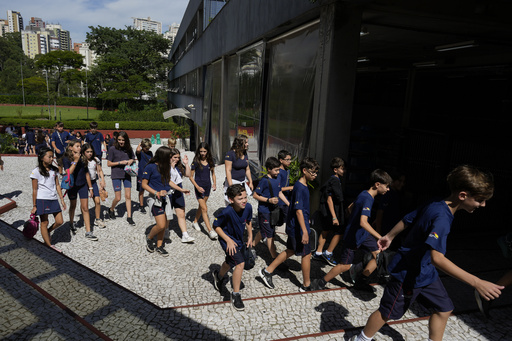SAO PAULO — As Brazilian students headed back to school this week, they faced a new challenge: adhering to a law that limits smartphone use in educational environments.
Signed by President Luiz Inácio Lula da Silva in January, this legislation seeks to strengthen restrictions on mobile phone access in both public and private educational institutions, reflecting a growing global trend seen in places like the United States and Europe. The law applies not only to classrooms but also to hallways.
While the use of phones remains permissible for educational purposes with the teacher’s consent or for health and accessibility needs, schools are given the freedom to draft their own regulations. This flexibility allows institutions to determine whether students can keep devices in their backpacks or if they should be stored in lockers or other designated areas.
Prior to the enactment of this federal law, a significant number of Brazil’s 26 states, including prominent ones such as Rio de Janeiro, Maranhão, and Goiás, had already implemented varying degrees of smartphone restrictions in schools. According to a survey conducted last year by the Brazilian Internet Steering Committee, nearly two-thirds of schools had some limitations in place, with 28% outright banning phones entirely.
However, the rules were inconsistent both across states and among different institutions, leading to challenges in enforcement by authorities and school administrators. This inconsistency helped galvanize support for the new federal law, garnering backing from diverse political sectors, including both supporters of leftist Lula and those aligned with former President Jair Bolsonaro, who is often regarded as far-right. An October survey by Brazilian pollster Datafolha indicated that almost two-thirds of participants favored a ban on smartphone usage for children and teenagers in schools, with over 75% believing that these devices were more detrimental than beneficial for their children’s well-being.
At Porto Seguro, a nearly 150-year-old private institution in Sao Paulo, the administration introduced a ban on smartphone use in classrooms last year and encouraged students to disconnect entirely once a week. This academic year, they expanded this ban to hallways, requiring that phones be stored in lockers throughout the school day, including during breaks. School principal Meire Nocito shared that students had been struggling to concentrate and noted that excessive use of technology often led to social isolation, with many students retreating into their phones during break times instead of interacting with peers.
“Implementing this ban has fostered more opportunities for social interaction, helping students build relationships and learn how to address conflicts, which are intrinsic to human connections. The change has been highly positive,” Nocito stated.
The Brazilian Ministry of Education emphasized that this new restriction is aimed at safeguarding students’ mental and physical health while encouraging a healthier relationship with technology. According to a report from Fundacao Getulio Vargas in May, Brazil possesses more smartphones than its population, with approximately 258 million devices available for 203 million residents. Last year’s statistics from local market researchers revealed that Brazilians spend an average of over nine hours daily on screens, among the highest usage rates globally.
Parents, institutions, and governments have increasingly linked children’s smartphone usage to a range of pressing issues, including bullying, anxiety, suicidal thoughts, and a decline in concentration. Other countries like China have already initiated measures to limit children’s smartphone usage, and France has instituted a ban for students aged six to 15. In the United States, eight states have also adopted laws to restrict smartphone access in a bid to lessen distractions in classrooms.
The growing concern over young children’s safety and mental well-being related to smartphone usage has prompted a rising number of parents in Europe to advocate for similar restrictions. A recent UNESCO report highlighted that one in four countries has restricted smartphone use in schools.
Mark Zuckerberg, CEO of Meta, expressed regret during a U.S. Senate hearing last year for the exploitation and bullying of children facilitated by social media, while reiterating the company’s commitment to safeguarding kids’ interests in their online presence.
Thirteen-year-old Mariana Waetge, a Porto Seguro student who has owned a smartphone for five years, noted that the device was primarily for staying connected with friends and family and finding entertainment on platforms like Instagram. However, the enforced break from her phone motivated her to engage differently with her friends, improve her focus, and even enhance her family ties.
“The restriction has created an environment where those who previously felt isolated are now included. Instead of retreating behind screens, students are engaging in activities like playing board games or reading books,” she remarked during an interview.
